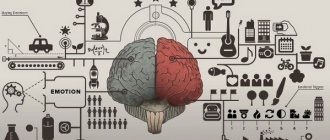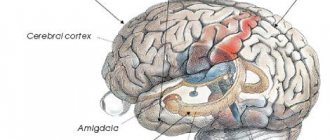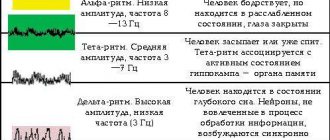Genetics determines a lot in our lives, but everyone knows that a child is not born a genius or a fool. Human intelligence depends on hereditary predisposition, but the most important role in realizing what is inherent in nature is played by external factors. A child's environment and personal experiences at an early age have a strong influence on mental abilities. Many parents try to develop their baby from the cradle. Is this enough? Social and pedagogical efforts are not decisive in the formation of cognitive activity. A child can successfully realize his potential even if he has a balanced diet. There is a relationship between the physical and intellectual development of a child and the quality of the food consumed.
Scientific information
Thanks to the accumulated scientific data on the effect of nutrition on the ability to think and cognition, an independent branch of modern medicine has emerged - neuropsychonutritiology. This is a scientifically based approach that explains the role of nutrients and other biologically active food additives in the development of intelligence, as well as psychological activity in the form of the ability to remember, artistic and musical perception. The need for a balanced and nutritious diet is important at any age, but it is of fundamental importance during critical periods of a person’s life - at the stage of intrauterine development, in the first two years of life and in adolescence. Let's look at the role of nutrition in a child's development and what is the optimal food for the brain.
Turmeric
Turmeric contains the substance curcumin, which stimulates blood circulation and improves memory, prevents the development of Alzheimer's disease and cleanses the body of amyloid plaques that form on blood vessels.
Turmeric also promotes the production of dopamine and serotonin - sources of good mood that prevent the development of depression. Therefore, it can be used as an antidepressant.
Plus, turmeric stimulates the growth of brain cells, thereby enhancing the neurotrophic factor. In fact, this is a real prevention of age-related dementia, deterioration of attention and loss of concentration.
Essential Nutrients
First of all, the most important influence on intellectual function is the intake of complete protein. It is a building material for all cells of the body, and in the first years of life, the growth and maturation of the central nervous system actively continues. In addition, essential amino acids such as leucine, valine and tryptophan are necessary for the synthesis of special substances - neurotransmitters, which are involved in the transmission of information and the formation of a neural network (relationships between nerve cells). There is also a relationship between the qualitative composition of the incoming protein and the speed of human thought processes. The source of essential amino acids is mother's milk, and then complementary foods of animal origin - meat, dairy products, fish and eggs.
Pumpkin seeds
Pumpkin seeds contain very strong antioxidants that prevent free radicals from damaging the body and brain. These seeds also serve as a source of copper, zinc, iron and magnesium - all of which are required for active brain activity.
Copper is involved in the control of nerve impulses and prevents the development of Alzheimer's disease. Zinc prevents the development of many neurological diseases, as well as Parkinson's disease and depressive conditions.
Iron maintains mental clarity and allows the brain to perform its functions normally. And magnesium is necessary for concentration and learning; It also prevents depression from developing and prevents headaches and migraines.
The role of carbohydrates
The mental process is very energy intensive: the human brain consumes over 20% of our body's total energy. Glucose serves as the main food for working neurons. Every adult knows that sweet tea or chocolate significantly improves intellectual performance. However, sugar and other easily digestible carbohydrates provide only short-term benefits and are not the best choice for active brain activity. After the rapid intake and consumption of glucose, a phase of decreasing its concentration begins and an energy deficit forms in neurons, which adversely affects thought processes. Therefore, it is more advisable to have a smooth and long-term supply of glucose into brain cells, and this occurs during the breakdown of slowly digestible carbohydrates. Cereal products are an essential supplier of glucose and energy to all cells of the body, including brain tissue. A balanced diet necessarily involves the inclusion of cereal dishes in the daily diet. Porridge is a traditional breakfast among residents of many countries, since the main activity, including intellectual activity, occurs in the first half of the day.
Avocado
As you know, the efficiency of the brain and the performance of its functions largely depend on good blood supply. Avocado, which contains fatty acids, promotes proper blood circulation, and also increases the elasticity of blood vessels and reduces cholesterol levels in the blood.
In addition to this, avocados contain dietary fiber. They are responsible for regulating blood sugar levels and controlling hunger. It is very useful to eat avocado as an independent fruit or add it to various dishes on your regular menu, such as salads.
Such different and necessary fats
The development of the brain in childhood is impossible without an adequate supply of fats from food, because this organ has a very high lipid content. These substances are the main structural components of neuronal membranes. The membranes of brain cells transmit impulses and form nerve connections that determine the process of learning, memory and perception. The structural role of polyunsaturated fatty acids (PUFAs) omega-3 and omega-6 is especially important. These compounds are found in fatty fish from cold seas, as well as in vegetable oils. The components must enter the child’s body in a certain ratio at the stage of intrauterine development, and then at an early age. And although a direct connection with the consumption of PUFAs and intellectual activity has not been established, they are certainly necessary for the proper development of the nervous system. Despite the importance of adequate intake of PUFAs, the role of saturated fat cannot be dismissed. Thus, these are the predominant lipids in breast milk; nature itself ensures their sufficient supply during the period of active growth of brain tissue. In addition to mother's milk, saturated fats come from dairy products, meat, and poultry eggs.
Features of the diet for a child
For the normal development of a child’s body, products from the list are required, which are necessary for the development and stimulation of full-fledged brain function. Except for some nuances.
- The diet of a child or teenager should contain more protein foods: white lean meat. fish, seafood.
- To compile a children's menu, spicy and hot seasonings are used somewhat less, focusing on the age and taste preferences of the child.
- Red wine is excluded, since ethanol in its composition is contraindicated for children.
The role of micronutrients
In addition to the main nutrients, minor food components influence intellectual function - their presence in foods is insignificant, but their role is difficult to overestimate. First of all, we are talking about vitamins, vitamin-like substances and minerals. The index of intellectual development in children increases significantly when these essential compounds are supplied in sufficient quantities. Most vitamins and minerals are not synthesized in the body; they must be obtained daily through food and water. Unfortunately, modern food products cannot be considered as the main source of these essential substances. Therefore, the concept of enriching the diet with the most necessary supplements to ensure the normal functioning of all systems and the prevention of deficiency conditions comes to the fore. What are the most important micronutrients for effective brain function?
B vitamins.
Among the large number of known water-soluble vitamins, it is necessary to highlight this combined group, which includes substances with a similar biological role, and they are often present together in food products. B vitamins are very important for the functioning of the nervous system. They regulate the synthesis of many structural elements of the brain and spinal cord, in addition, they provide emotional responses and are important for mental health. Vitamins B6 and B12 have the greatest influence on the processes of assimilation and processing of information, concentration and memorization. Severe deficiency of these substances in children can cause the development of mental retardation. This group of vitamins regulates the synthesis of substances that are involved in the transmission of impulses between nerve cells - neurotransmitters, thus influencing various processes of brain activity.
A nicotinic acid.
Vitamin PP in modern medicine is used not only as a biological food additive, but also as a medicine - nicotinic acid. This substance can improve blood flow, including in the brain, and also regulate multiple biochemical reactions in cells, determining their activity. Its supply in sufficient quantities is extremely important for intellectual activity. With a deficiency of vitamin PP in the body, a decrease in cognitive function and loss of previously acquired knowledge and skills occur.
Iodine.
It is part of the thyroid hormones, which regulate the formation of brain structures and overall energy metabolism. With insufficient intake of this mineral at the stage of intrauterine development, as well as in early childhood, disorders of cognitive and speech functions are typical. Unfortunately, iodine deficiency is one of the most common pathological conditions of a non-infectious nature in children all over the world. This is due to insufficient intake of this macronutrient from water and food. Therefore, it is imperative to control its additional intake in the form of fortified food products.
Magnesium and iron.
The need for these macroelements increases during periods of active growth and development. Therefore, a deficiency of these minerals in childhood is also not uncommon. Magnesium helps normalize the electrical activity of cells in the central nervous system and increase the body's resistance to stress. A characteristic effect of this mineral is a decrease in the overall level of anxiety and normalization of sleep. However, in addition to the general calming effect, magnesium can have an effect on learning processes and the formation of neuronal memory. A sufficient supply of this mineral improves concentration and regulates memory processes. The brain is the most active consumer of oxygen in the body, so its normal functioning is impossible with iron deficiency. This element in the structure of a special protein of red blood cells binds oxygen in the lungs, and in the cells exchanges for carbon dioxide, thereby ensuring cellular respiration and high functional activity of the brain.
Coffee
Despite the fact that drinking a lot of coffee and often not very beneficial for the body, most people start their day with this drink. Well, that's a good thing because it contains antioxidants and caffeine, which are good for the brain. They improve attention by blocking the production of adenosine, which causes drowsiness.
Studies have shown that people who drink coffee perform better at tasks that involve increased concentration than those who don't drink coffee. In addition, coffee stimulates the production of serotonin, which improves mood, and also reduces the risk of Alzheimer's and Parkinson's diseases.
The role of prebiotics
Enriching food with prebiotics (substances that have no nutritional value for humans, but can improve the functioning of one’s own intestinal microorganisms) can lead to an increase in the formation of special substances (short-chain fatty acids) that are absorbed in the intestines and enter the brain. These substances can stimulate the synthesis of a certain protein that plays a key role in learning and memory. In addition, they help increase the formation of substances (serotonin and GABA), which improve perception and emotional background. There was even a special term for prebiotics in connection with their established effects in the brain - psychobiotics.
Flax seeds
You can often hear nutritionists and nutritionists calling flax Russian fast food. And this is not at all easy, because it contains a record amount of omega-3 fatty acids, as well as fiber, magnesium and B vitamins. This set of substances very quickly saturates the brain and incredibly improves concentration.
Keep in mind that flax seeds are covered with a dense shell, which is why they may not be absorbed very well. It is best to consume them in ground form: either a teaspoon in pure form, or as an addition to soup, yogurt, salad or smoothie. Truly a wonderful thing, and very tasty too.
Baby food
Caring parents have a real opportunity to ensure a successful start for the intellectual development of their child. Modern specialized industrial baby food products are designed taking into account scientific research data on the role of various compounds in the health and development of children. Bebi Premium products are more than just food that satisfies basic nutritional needs. This is a functional food, where the recipe of each product is selected taking into account the individual needs of a child at this age. The enriched composition is not a simple set of useful substances, it is a quantitatively and qualitatively balanced combination of biologically active compounds. Bebi Premium milk porridge is a complete protein, complex carbohydrates, vegetable and animal fats, as well as an enriched composition that includes everything a baby needs for successful intellectual development: vitamins B6, B12 and PP, iodine, magnesium, iron in the required daily dosage. And porridge with the addition of prebiotics means a healthy microflora, which means an excellent mood and active cognitive activity.
Oranges
Oranges are the richest source of vitamin C, and one such fruit contains your daily requirement. Naturally, oranges are very good for the brain, because vitamin C, as studies have shown, prevents the aging process from developing and prevents the occurrence of diseases associated with it.
Plus, eating these orange fruits prevents free radicals from affecting the brain. And along with oranges, vitamin C is found in large quantities in strawberries, tomatoes, kiwi (it’s generally called the vitamin bomb), guava and bell peppers.
But the list of goodies that improve brain function and the ability to concentrate is not exhausted by the listed products. In addition to them, we strongly recommend that you take note of some herbs.











